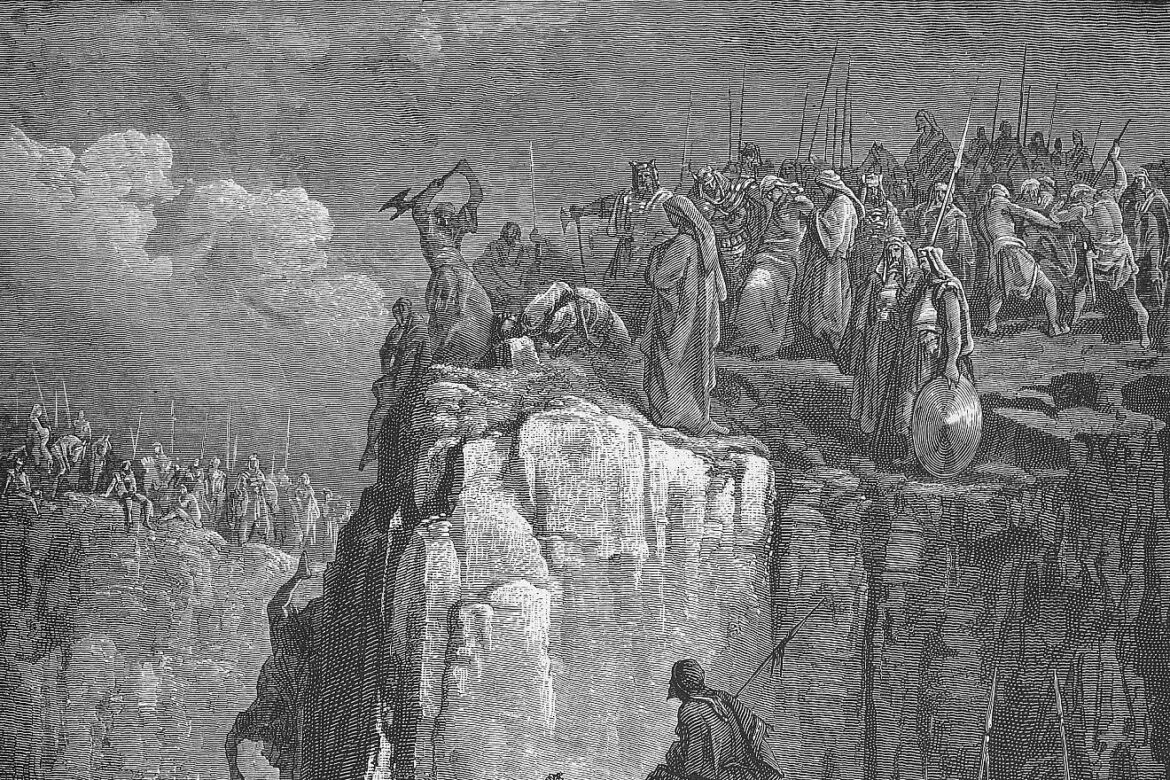Elijah teaches us a lesson for every generation, including our own.
RABBI YOSSY GOLDMAN

Rabbi Yossy Goldman is Life Rabbi Emeritus of Sydenham Shul in Johannesburg and president of the South African Rabbinical Association. He is the author of From Where I Stand, on the weekly Torah readings, available from Ktav.com and Amazon.
This week we will have the unusual opportunity of marking the leap day of Feb. 29. But Jews, who are characteristically generous, don’t have just a leap day. We have a whole extra month.
With a full 13th month of Adar II, the Haftarah read in shul this week will be a well-known biblical story from the First Book of Kings, which is not usually read in an ordinary calendar year. It is the famous story of Elijah the prophet, and his fight against the idolatrous King Ahab and his heathen wife Queen Jezebel, who actively promoted paganism in the Holy Land and had many of the Hebrew prophets put to death.
The Israelites were wavering between the worship of Baal and the worship of the true God of Israel. Elijah decides that dramatic action is needed to bring his people back from idolatry and confusion to monotheism and faith in the one God. He challenges Ahab to a duel, not with Colt .45s, but with prayer.
The 450 prophets of the idol Baal and Elijah—the one prophet of the one God of Israel—ascended Mount Carmel. Each side was to prepare an animal offering on an altar and pray to their deity. The one whose offering would be consumed by a fire from heaven would have proven the authenticity of their God.
“Give us two bulls and let them [the prophets of Baal] choose one bull for themselves and cut it up and place it on the wood, but fire they shall not put; and I will prepare one bull, and I will put it on the wood, and fire will I not place. And you will call out in the name of your deity, and I will call out in the name of the Lord, and it shall be that the one who will answer with fire, he is the true God.” (First Kings 18:20-39)
The prophets of Baal agreed to the challenge and many thousands gathered on the mountain to watch the dramatic showdown. This would be the final faceoff to determine who was the one true God.
The prophets of Baal went first. Naturally, their prayers and entreaties went unanswered. Elijah even taunted them: “Perhaps your god is sleeping or on a journey. Pray more loudly, perhaps he doesn’t hear you.” Of course, despite all their prayers, incantations and shenanigans, there was no reply from above.
As evening approached, Elijah took center stage. He built an altar, placed the animal upon it, poured water all around the altar and offered a short but powerful prayer: “Lord, God of Abraham, Isaac and Israel. Let it be known this day that You are God in Israel and that I am Your servant, and at Your word have I done all these things. Answer me, O Lord, answer me, and this people shall know that You are the Lord God.”
As Elijah finished his prayer, a fire descended from heaven and consumed his offering: “And all the people saw and fell on their faces, and they said, “The Lord is God, the Lord is God.”
It is with these very words that, to this day, we conclude the sacred Neilah prayer at the end of every Yom Kippur.
This is a powerful, inspirational story. Just as it demonstrated to the Jews of that generation that the one God alone is worthy of our worship, so does its stirring message speak to us today.
But I am not here to marvel at God’s miracles. To God, miracles are nothing special, just an everyday routine matter. To me, the bigger and more moving miracle is how one mortal man of flesh and blood stood up to the most powerful ruler in the land. Ahab was the king and had an army at his beck and call. Elijah was one lone voice in the wilderness. He had been persecuted, was on the run and almost all his righteous compatriots had been murdered by the king and queen’s forces. Still, he spoke truth to power.
It would have been so much simpler and easier for Elijah to change his tune and go along with the popular thinking of the time. No doubt there were plenty of Jews who must have told him, “Don’t be such a fanatic. Why are you so rigid and inflexible? So what if they dabble a bit with Baal? Everyone is doing it these days. If you cooperate with the king, you may even become the chief prophet of the land!”
But Elijah remained faithful to his beliefs and stuck to his principles. In the end, his prayer was answered, the miracle happened, and he was able to inspire and turn his entire nation back to God.
So, to my mind, bigger than a fire coming down from heaven is the miracle of Elijah’s faith, fortitude, strength of character and courage of his convictions.
Today, the prophets of Baal are gone without a trace, but Elijah—Eliyahu Hanavi—has gone down in history as one of the greatest prophets of all time. He continues to be remembered at every bris and Pesach seder around the world, down through the generations. One dissenting opinion, one man of principle who took the long hard road, lives on forever.
Falsehood may be fashionable, but truth is timeless. Lies, like any fad, soon go out of fashion, but truth is eternal. Compromising principles for popularity works in the short term, but soon leaves us emptyhanded and chastened.
Elijah teaches us a lesson for every generation, including our own. No wonder we are told that Elijah will be the precursor to the ultimate Messenger of Peace who will herald the Messianic Age. He is the harbinger of Moshiach. Ultimately, principled living will bring peace much sooner than pandering to the whims of the moment, as popular as they may be.
We have seen the success of peace through strength. We also need peace through truth.
Image: “The Prophets of Baal Are Slaughtered” by Gustave Doré, 1866. Source: Wikimedia


